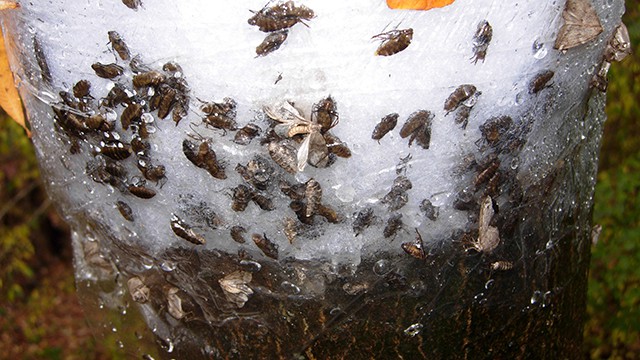Here’s When Mississauga is Getting Rid of Horrifying Insects
Published May 17, 2018 at 6:14 pm

Icky bugs in Mississauga; it’s finally feeling like summer is about to kick off.
And that means the city can begin battling the burgeoning cankerworm and gypsy moth caterpillar populations.
· Credit Reserve
· East Collegeway
· Erin Woods
· Erindale Park
· Erindale Village
· Erindale Woodlands
· Gordon Woods
· Lakeview
· Lorne Crest
· Lorne Park Estates
· Meadow Wood – Rattray
· Mississauga Oakridge
· Mississauga Road
· Owenwood
· Port Credit Village
· Riverwood
· Sawmill Valley Drive
· Sherwood Forest
· Sir Johns Homestead
· Upper Parkland
· Whiteoaks Lorne Park
A traffic plan requires temporary roads, parks and trails closures, including Rattray Marsh. The closures are necessary to meet approval requirements from Transport Canada, according to the city.
As for noise, you may hear helicopters during the early morning. “All necessary safety precautions are taken to ensure minimal risk to the public, staff and the applicators,” the news release reads.
Residents are unlikely to experience any health effects and no special precautions are necessary or required. Individuals who would like to avoid exposure during a spray program may wish to consider the following measures:
- Remain indoors during the spray and up to 30 minutes thereafter.
- Close doors and windows when the spraying is taking place.
- Bring in laundry, toys and pets indoors before spraying begins.
- Practice good personal and food hygiene (e.g. hand washing after outdoor activities, especially after gardening; leave outdoor shoes at the door; washing all fruits and vegetables before eating or cooking).
- Cover lawn furniture, automobiles, outdoor tables, pools, BBQs, play equipment and sandboxes and/or rinse them with water after spraying is finished.
- Leave heating units/air conditioners on, with vents set to the closed position, or selecting the recirculate function.
- Contact Peel Public Health or your family physician if you are concerned that a personal medical condition may be aggravated by the spraying.
The spray being used is called Bacillus thuringiensis subspecies kurstaki (Btk), registered under the trade name of Foray 48B. Btk is a naturally occurring bacterium found in soil and is not a chemical. It has been “successfully used ” in 2006 and 2007 to control gypsy moth populations, according to the city.
Once applied, Btk biodegrades quickly, in approximately one to four days, through exposure to sunlight and other microorganisms. There are no groundwater contamination concerns as Btk does not travel through the soil beyond 25 cm. Btk is specific only to caterpillars and does not have impacts to mammals, birds, fish, or other insects, including honey bees.
Residents with questions or concerns related to the health impacts of aerial spraying with Btk can call the Region of Peel Public Health at 905-799-7700 or speak to their family physician.
To find out if your home is in the spray area or for up-to-date information about the aerial spray details such as road closures, spray dates, times and locations, call 3-1-1 or click here.
